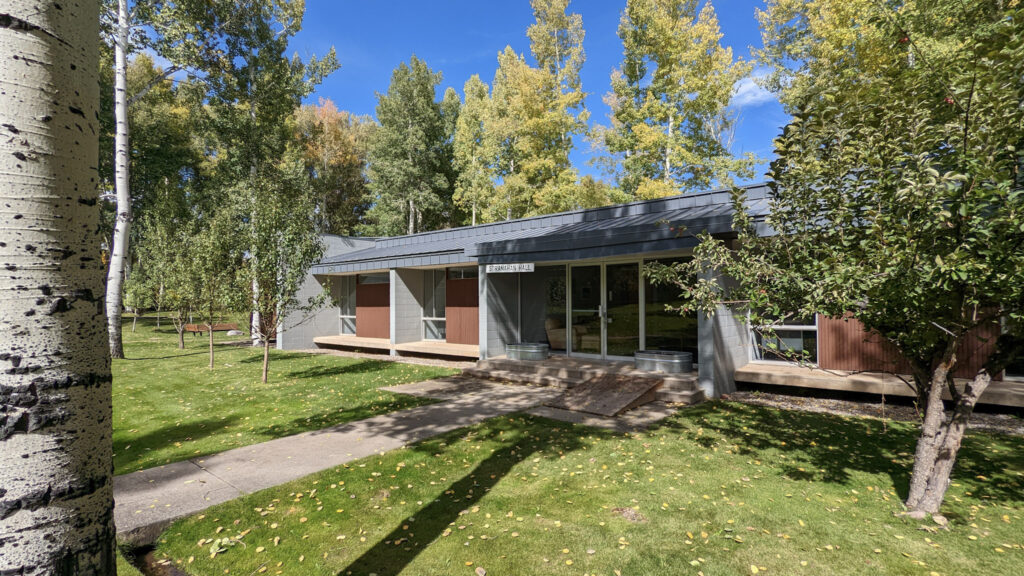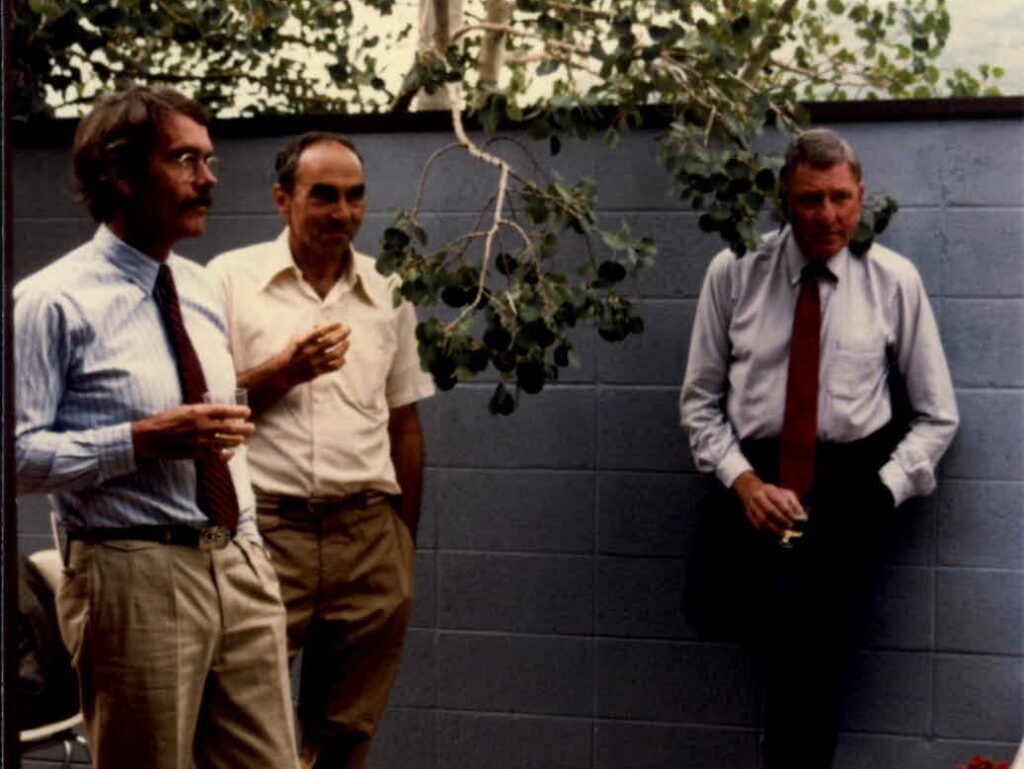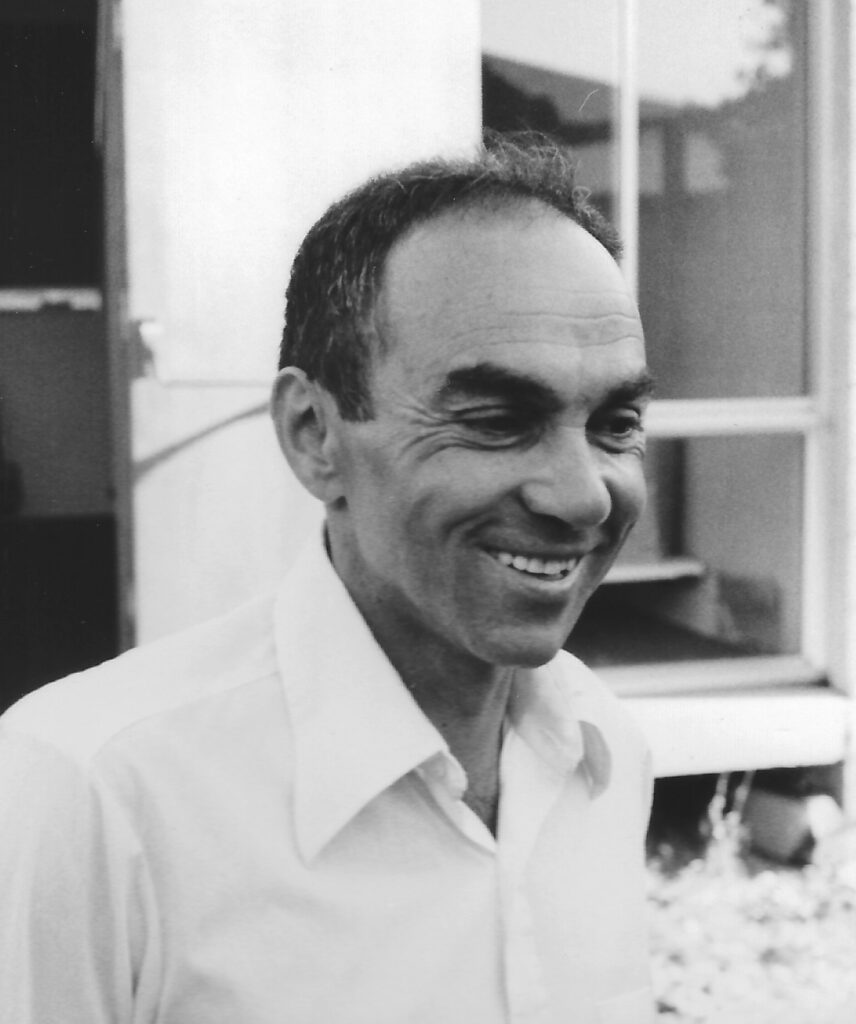Recent Posts in Historical

Building by Design: The Architecture of the Aspen Center for Physics & the Aspen Idea
By Aruna Balasubramanian
The buildings at the Aspen Center for Physics (ACP) reflect the history of Aspen’s development in the late twentieth and early twenty-first centuries. Their very location, in a plain alongside Gillespie Street

The Founding of the Aspen Center for Physics
By George Stranahan
In 1957 I theorized that if a guy with three kids going to graduate school in Pittsburgh on the GI Bill could rent a house plus jeep in Aspen for three summer months at $400, he’d be a damn fool for not getting outta town. Part of the theory was that, since paper and pencil […]

The History and Structure of the Aspen Center for Physics: Some Comments
By Loyal (Randy) Durand
The Center started as a division of the Aspen Institute in 1962, but some members of the Institute’s rather conservative board thought we didn’t fit in after their operating head (Bob Craig, one of the most promising 100 young organizer/CEO types in the country according to Life Magazine, and a science promoter in the Institute, […]

Essay from Jane Kelly
By Jane Kelly
Pierre Ramond started his first term as president (mid-year, which was an oddity, but I didn’t know it at the time), and I began a steep learning curve...

The Tent City That Never Was
By Michael Cohen
Surely you were joking, Mr. Cohen. The notion of a bunch of physicists living in tents and exchanging thoughts when not fending off bears is ridiculous. (More so than seven curled-up dimensions?) In retrospect, my concept of a tent city was a metaphor for the idea of a group of physicists doing their own thing […]

The Early Years of String Theory at ACP
By John H. Schwarz
We reminisce about some of the highlights in the development of string theory at the Aspen Center for Physics during the period 1969–1984, especially the authors’ collaboration in the period 1980–1984.

Aspen on the Road to Supersymmetry
By Pierre Ramond
In 1969, I was a postdoctoral fellow at the National Accelerator Laboratory, known today as Fermi National Accelerator Laboratory. Its director, the late Bob Wilson, was ruling the roost.

Particle Physics: The Early Years
By Loyal (Randy) Durand
The early program at the Center (then the Physics Division of the Aspen Institute for Humanistic Studies) was very informal. There were no organized workshops, and people came when it fit their schedules and housing was available...

Letter from Sally Hume Mencimer
By Sally Hume Mencimer
In March of 1964, I was teaching English at Aspen High School, grades 9-12. Needing a summer job, I interviewed at the Aspen Institute for Humanistic Studies to be the Secretary for the newly formed Physics Division. I was hired.

Particle Physics History
By Howard Haber and Joseph Lykken
It started small: a few dozen physicists making their way to Aspen in the summer, with plenty of time to think and discuss but no formal program. It wasn't a conference or a school; it was a new way for theoretical physicists from around the world to get together and interact.

Condensed Matter Physics: the First Fifty Years
By Ravindra N. Bhatt
Condensed Matter Physics, or Solid State Physics as it was then called, had a slow start in early years of the Aspen Center of Physics (ACP). Much of the activity during the first decade involved participation by a few key players who, convinced of the unity of all subfields of physics, decided to participate in activities at the Center,

Astrophysics: The Modern Era
By Josh Frieman
By the mid-1990’s, astrophysics had become fully integrated into the activities of the Aspen Center for Physics, on a par with particle physics and condensed matter physics in terms of the number of members and officers and the number of and participants in workshops.

Astrophysics: The Middle Years
By Michael S. Turner
I came to Aspen for the first time in 1979. I was a young postdoc attending the NASA astrophysics workshop, that year entitled Stellar Collapse and Neutrino Physics. By then, astrophysics was a well-established part of the summer program and many astrophysicists attended on a regular basis,

arXiv's Beginning at the Aspen Center for Physics
By Paul Ginsparg and Joanne Cohn
My first visit to the ACP was during its 20th anniversary year of 1982 (I still have my “30th anniversary” t-shirt from 1991), one year after my doctorate. Enchanted by the mountains, the music, and the open exchange of ideas, I returned frequently during the following decades.

The Aspen Center for Physics - How It All Started
By Michel Baranger
I have been a mountain man all my life and many of my friends have been mountain people. Back in 1960, when I was at Carnegie Tech, I had two friends who were both physicists and mountain men, Michael Cohen and George Stranahan.

The Joys of Aspen
By Sydney Meshkov
Going to the ACP over the years has played a major part in my personal and scientific life. I first came to ACP in 1968. It was the year when Hilbert Hall was built – now the space where it once was is called the Hilbert space.

“Physics Utopia:” The Aspen Center for Physics
By Aruna Balasubramanian
In 2001, The New York Times described the Aspen Center for Physics (ACP) as a “physics utopia,” and for good reason. The ACP is the only place on Earth where physicists can come to “talk, think and write [...] while training like Olympians – hiking, scaling 14,000-foot peaks, cycling up mountain passes, jogging and playing cut-throat volleyball in Aspen's thin air at 8,000 feet.”

The Founding of the Physics Division of the Aspen Institute for Humanistic Studies
By Robert Craig
In the fall of 1953 when I returned to my home in Aspen from an expedition to K2 in Pakistan, Walter Paepcke (despite doubts of my sanity for venturing to the Himalayas) hired me as Executive Director and Assistant to the President of the Aspen Institute for Humanistic Studies. To acquaint me with what I […]

Astrophysics: The Early Years
By J. Craig Wheeler
1962-1979 Astrophysics was entangled in the DNA of the Aspen Center for Physics from the beginning, even if it was not immediately apparent. Although George Stranahan, the visionary founder of the Physics Center, practiced condensed matter physics during his research career, he read astronomy books on his own time during his stint at the Hotchkiss […]

Presidential Essay from Rosemary Wyse
By Rosemary Wyse
The highlight of my tenure as President was undoubtedly the 50th anniversary of the ACP in 2012, which we celebrated with a summer filled with joyful events. The physicist members plus the indefatigable staff - Jane Kelly, Paula Johnson and Patty Fox

Presidential Essay from Andy Cohen
By Andrew Cohen
I first came to the Physics Center as a student in the late 1980s. At the time I had not yet settled on physics as a career, and my knowledge of how physics as a profession operated was practically non-existent.

The First 35 Years
By Jeremy Bernstein
I made my first visit to the Aspen Center for Physics in June of 1969. The Center had been in operation since the summer of 1962 and from the beginning one of its founders, Michael Cohen, had been urging me to apply for a visit. There was a selection committee.

Presidential Essay from Andrei Ruckenstein
By Andrei Ruckenstein
I first visited the Aspen Center for Physics (ACP) in the summer of 1985, one year after I finished my PhD and joined the theory group at Bell Laboratories. That June I had the opportunity to spend one month with my now-good friends, Dieter Vollhardt and his post-doc supervisor, Peter Woelfle at the Max Plank Institute and the Technical University in Munich

Presidential Essay from Eric D'Hoker
By Eric D’Hoker
My first contact with the Aspen Center for Physics dates back to 1982... Colleagues had coyly described a summer institute, high up in the Rocky Mountains. This sounded exactly like my kind of place to spend the summer.

Presidential Essay from Tom Appelquist
By Thomas Appelquist
During my first year as President (1993–1994), we decided to replace Hilbert Hall with a new building, and began a major development campaign for this purpose. We engaged the architectural firm of Harry Teague and Company which developed initial design ideas by the summer of 1994.

Presidential Essay from Mike Turner
By Michael S. Turner
My presidency was a transitional one, linking the “Founders' era” to the “Modern era.” I was the first “young Turk” President, by which I mean one whose roots didn't trace to the Center's Founders and one who railed against the old boys.

Presidential Essay from Mike Simmons
By L. M. (Mike) Simmons, Jr.
In the 50s and 60s an important summer program in physics was the famous Boulder Summer Theoretical Physics Institute. Every graduate student studied the published lectures. As a postdoc I applied to Boulder for 1966.

Presidential Essay from Peter Kaus
By Peter Kaus
In 1956 I found myself in Princeton. I was simultaneously at RCA Laboratories, designing the deflection yoke for the first commercially successful (21 inch) color TV tube (my first salaried job) and at the Institute for Advanced Study as an (unpaid) scholar finishing my thesis work on self composite fermions (Solitons).

Presidential Essay from Elihu Abrahams
By Elihu Abrahams
In late summer of 1979, I was elected ACP President. It can be appreciated that by this time, the Center was a smoothly functioning institution under the firm guidance of Sally Hume Mencimer, its Administrative Vice President. Therefore, the position of President appeared to me to be not very burdensome

Presidential Essay from Paul Fishbane
By Paul Fishbane
First things first: We can all be discretely proud, through our efforts to make it possible, of the scientific work that took place at the Center. I couldn't begin here to summarize the real work that took place while I partly watched from my administrator's perch

Presidential Essay from Randy Durand
By Loyal (Randy) Durand
I will start somewhat before the beginning of my term as President to make clear the rapid changes that were taking place in the Physics Center through the transition period, and their influence on the subsequent development of the Center.

Presidential Essay from George Stranahan
By George Stranahan
In 1957 I theorized that if a guy with three kids going to graduate school in Pittsburgh on the GI Bill could rent a house plus jeep in Aspen for three summer months at $400, he’d be a damn fool for not getting outta town. Part of the theory was that, since paper and pencil […]